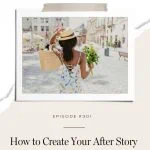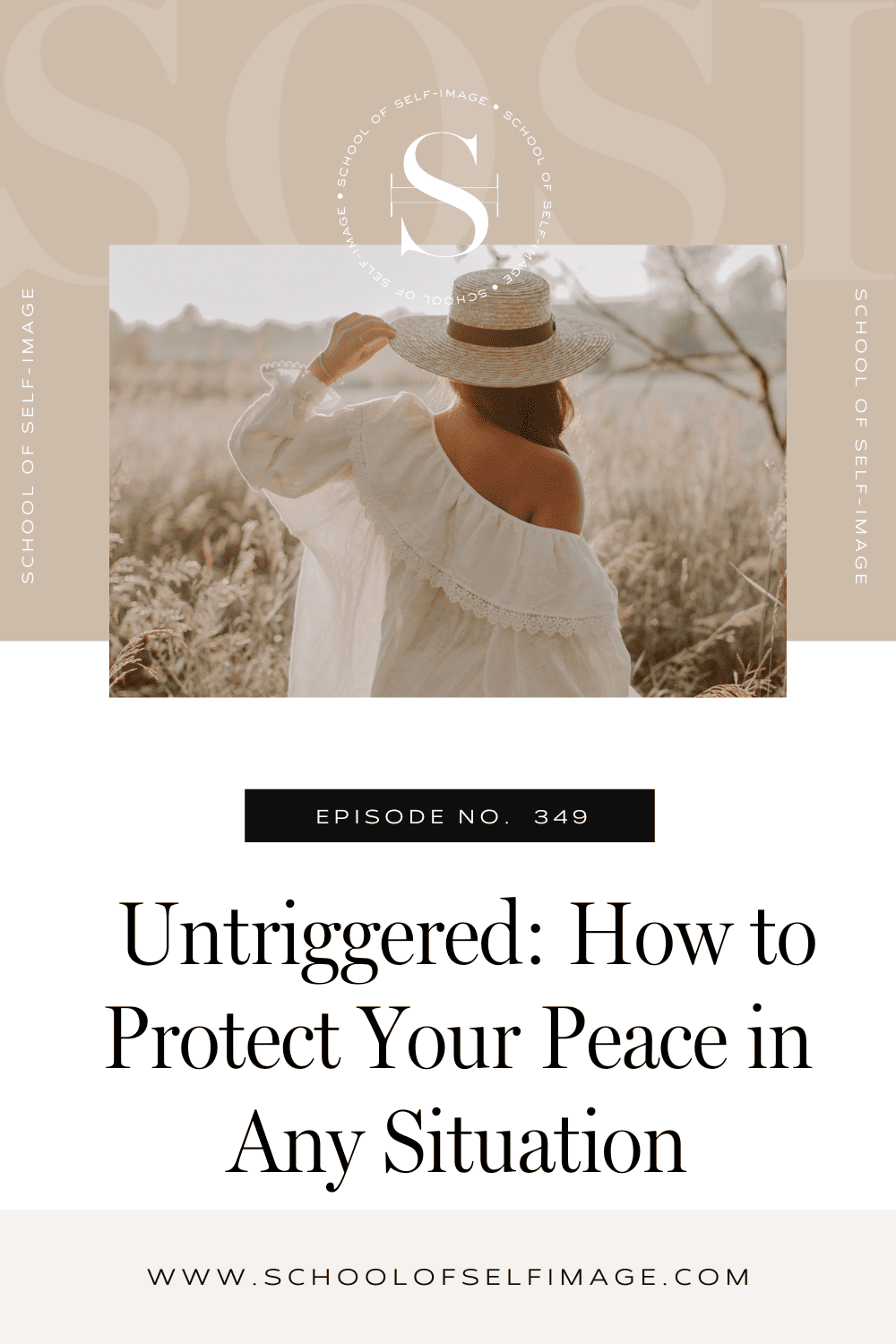
 In this week’s episode, Tonya shares her own challenges she is currently facing around understanding and overcoming emotional reactions, or triggers, and how we can get untriggered. Tonya discusses the concept of feeling triggered and how to become unbothered by external events and emphasizes the importance of emotional resilience. She also announces the upcoming “Week of Calm” challenge and encourages listeners to sign up for this transformative experience. Tune in to gain insights on handling emotional triggers and finding inner peace.
In this week’s episode, Tonya shares her own challenges she is currently facing around understanding and overcoming emotional reactions, or triggers, and how we can get untriggered. Tonya discusses the concept of feeling triggered and how to become unbothered by external events and emphasizes the importance of emotional resilience. She also announces the upcoming “Week of Calm” challenge and encourages listeners to sign up for this transformative experience. Tune in to gain insights on handling emotional triggers and finding inner peace.
The breakdown:
- 00:02:27 Being untriggered
- 00:06:20 Reacting to triggers
- 00:09:12 Childhood coping mechanisms
- 00:17:39 Accepting and experiencing human emotions
- 00:18:49 Exploring irrational thoughts
- 00:24:04 Protecting our peace and discomfort
Quotes
Useful Resources:
- Join Now! https://schoolofselfimage.com/join
- Week of Calm: https://schoolofselfimage.com/calm
- FREE Download: https://schoolofselfimage.com/self-image-manifesto/
- Join us at SOSI South!: https://schoolofselfimage.com/south
- Sign up for the Weekly Edit!: https://schoolofselfimage.com/EDIT
Connect with Self-Image Coach Tonya Leigh:
- Website: https://schoolofselfimage.com/
- Instagram: https://www.instagram.com/schoolofselfimage
- Facebook: https://www.facebook.com/TonyaLeighOfficial
- TikTok: https://www.tiktok.com/@thetonyaleigh
- YouTube: https://youtube.com/@tonyaleighofficial
Do you ever feel triggered? Something happens outside of you and out of nowhere you feel a deep emotional response. Maybe it’s anger, maybe it’s frustration, but you may even feel like you want to punch a wall and you don’t like it. You want to be unbothered. You want to be untriggered. Well, if that’s you, this episode is for you. So let’s dive in.
Welcome to the School of Self-Image where personal development meets style. Here’s your hostess, Master Life Coach, Tonya Leigh.
Hello, my beautiful friends. How are you doing? How are you feeling? I am not feeling so great. I’m battling a cold physically and I am dealing with some stuff emotionally, which is always super fun, right? In fact, when I sat down to look at what the podcast topic was going to be for today, I thought it was very, very fitting. So just so you all know, I choose these topics months in advance. I sit down with my creative director and we really think through what the theme of each month is going to be in terms of the edit and choosing podcast topics that I feel will be beneficial to you. And it just so happens that the topic that I’m covering today is also beneficial to me. It’s something that I am working through right now, so it couldn’t be more perfect. And I’m really excited to share it with you.
But before I do, I just want to ask you, have you signed up for the week of calm yet? If not, what in the world? It's happening soon and of all of the challenges that I've done, I think this is the one that we received the most positive feedback around. In fact, we've had over 25,000 women go through the last week of calm that I did, and we have revamped it. We have updated it and it's going to be even better than ever. So if you are needing some calm in your life right now, as I feel most of us do, make sure you head over to sosistaging.wpenginepowered.com/ forward slash com and read all about it and sign up. It is absolutely free, and it would be a delight to have you join us. All right, let's dive into today's topic, which is all about being untriggered, how to protect your peace in any situation.
Now, I want to just start out by saying that I believe the quest to being untriggered is a beautiful one because it means that you are healing yourself because every trigger is just showing something within you that needs to be looked at with love and compassion and healed. That’s it. And I don’t know for us mere mortals that it is possible to be completely untriggered because as we go through life, we experience wounds and hurts and disappointments. But the quest to be untriggered, I think, is a beautiful one. And so that’s what I want to talk about today. I want to talk about how I personally deal with triggers and how I am dealing with them in new ways, because the ways that I have dealt with them in the past have been very protective, but I don’t know that they have really helped me to grow and evolve at the level that I want to grow and evolve at now.
So let’s start this conversation now by talking about what is an emotional trigger. It’s when some kind of external event or even an internal one, you can start to think about something and feel triggered, but it evokes this strong emotional response. And it can be a negative trigger. So you start to feel anger or sadness or anxiety or other intense emotions, or it can be a positive one where you start feeling intense joy and happiness and excitement. For the purpose of today’s episode, we’re going to be talking about those negative triggers. And over the past week, I have been triggered several times by someone that I love deeply. And it’s given me an opportunity to really look within myself at what’s going on and to work through some deep, deep wounds that quite honestly, you all I thought I was done with, but apparently I’m not.
Sometimes I feel like, and this is just a total side note, I feel as if we can put people on pedestals, especially our teachers, our coaches, our mentors, and we can start to think that they are perfect and they have the answer to everything. And I never ever want to place myself in a position where I don’t share my humanness. If you are working with someone and they have created this facade, this illusion that they have it all figured out, I’m just going to encourage you to realize that they are human just like you. And we are all learning and we are all figuring things out. And when I’m having a hard time, I typically don’t like to share and tell them on the other side of it, because I don’t want to dump my problems on my community. And so I often share after I’m on the other side of it, but it just so happens that I’m in it right now. I’m in the muck of it. And I am working through some really deep stuff and it happens to coincide with today’s topic. And so I’m just going to share with you my process if that’s okay. And if it’s not, you can just turn off the episode right now.You can come back next week.
But if you want to learn, maybe you’re triggered right now. I really, really hope that this episode will support you. So let’s start this conversation out by talking about how we react to triggers. And I have identified six ways that most people react to a trigger. The first one is some people fight. This is when they react, they may say hurtful things. They may even get physical. They get very, very aggressive. Other people flee. It’s so uncomfortable that they just want to escape. They want to run. They want to get out of the situation to protect themselves. Some people freeze, meaning they just stand there and they do nothing. And oftentimes when you’re freezing, what you’re doing is you disconnect from your body and the feeling of overwhelm just causes you to shut down, making it very, very difficult for you to express your feelings. You just stay put and you just hope that it goes away really quickly.
Another way that sometimes we respond to a trigger is that we fawn, meaning we people please. We say whatever we need to say to get the other person to calm down or to stop whatever they’re doing or to win their affection. We people please at our own expense. The other thing that we may do is fault. We will blame the other person or we’ll blame ourselves for what is happening. Those five reactions are from our trauma and they all probably protected us in the past. I was having a conversation with Fonz not too long ago when we were talking about this because Fonz’s reaction when he’s not aware is to fight because he grew up in a childhood where if he did any of these other things, it would literally get him killed. If he would flee, they were going to find him. If he froze, he was going to get beat up. If he people please, he was going to be seen as weak. If he found fault or didn’t stand up and take responsibility, he would be seen as weak.
His reaction and what he learned to do from a very young age is fight. It’s so interesting even now. I rarely see him in that energy, but if he’s backed in a corner, I can see where this is the energy in which he responds to a trigger. It’s so understandable. What’s interesting is we have this conversation how he sees that as a strength to being a fighter. I tried to explain to him, I’m like, but listen, when I was a child, if I tried to fight, I would get in deep, deep trouble.
What served me and what protected me was to either freeze or, and this comes when you have abuse, right? You freeze and you just hope it’s over really, really soon or to fawn, to people please. Those were my strengths. Those kept me safe. And so I share this with you all because no matter which of these that you may tend to go to when you’re triggered, don’t judge them. They all kept you safe as a child. They were your strengths. They were not your weaknesses. However, as we grow up into big people, into being adults, it’s time that we step into the sixth option. And that is to face our triggers.
So we can fight, we can flee, we can freeze, we can fawn, we can find fault, or we can face the trigger. And we can use that trigger to evolve us to the next level to really look at what is wanting to be healed here. What do you need to recognize? What part of you needs a hug? What part of you needs to step up and claim your power? And so I want to share with you how I’m dealing with my current triggers. Now, to be clear in the past, my response has typically been to flee. So to get away from it and try to never be around it again. And that is one option. But eventually, if you don’t heal what that trigger is, it’s going to pop up somewhere else.
My other common reaction has been to just freeze. And the way that looks for me is just to like, hope it goes away really soon. Just take some deep breaths and close my eyes and just like pray that it leaps. And because I experienced abuse as a kid, this makes sense. This is how I dealt with it. Because I didn’t have the tools that I had now. I didn’t have the autonomy. I was a child depending on adults. And so I would just literally like close my eyes and just pray, let this be over really soon. And then the other way was to fawn. Tell people how amazing they are, see what they need and to give that to them so that there wouldn’t be a confrontation.
However, these days, my work is to face it, face the trigger head on, not to be afraid of it, but to use that trigger to open me, to teach me, to guide me, to help me learn and help me to evolve to the next level. So as I was saying, I recently have been triggered. Someone I love deeply said something that really hurt, hurt my heart. Now we could argue that my thoughts about what this person said is what hurt my heart. And that is true. But I don’t believe in us gaslighting ourselves and trying to pretend that we can just change our thoughts and be better. Because sometimes maybe it’s not about us changing our thoughts.
Sometimes these triggers are to let us know, hey, this behavior isn’t okay. Sometimes, however, it is something that we need to change. And many times that has been my process of realizing, oh, this has nothing to do with that person. It has everything to do with me and something that I need to heal. But in this situation, I’ll tell you what I did. So this person said something and I could just feel for the first time in a long time, just anger. And that’s not typically an emotion that I feel. I feel anger when I feel like I’m backed in a corner. And I think what had happened is that stuff started to add up that I was just fleeing from or freezing from or fawning over. And I hadn’t addressed it. And that was on me. I told you all this is going to be a very vulnerable post for me, but I want you to see my very human side. This is it. And so when the person said this thing, I got so angry. Like I could feel heat in my body. And I noticed what I did. I said something immediately. I’m like, what did you just say to me? And we exchanged some words and I could feel myself wanting to flee.
I was afraid of what I was about to say, but I did the following steps. And this is what I encourage you to do. And listen, we’re going to mess it up. We’re not going to do it perfectly. We’re going to say things we don’t mean. We are going to screw up. That’s just part of being a human. It’s part of this process. So the first thing that I did after we exchanged a couple of words, which goes to show you, you can start this process at any point. You can be in the middle of an argument after you’ve been triggered and do this. Okay. I took what I call a sacred pause. So that’s step number one, take a sacred pause, which means to take a deep breath and if possible, remove yourself from the situation. Now, this is very different than you just running away because the intention is different, right? The intention is like, I want to remove myself for a moment just so I can get myself together.
It’s not like I want to run away forever and never address this, but it’s, I need to remove myself so that I can go within. So that’s step one. I even use this with my clients who overeat. I’m like, between that moment of wanting to eat, just take a pause and go in and check with yourself. Then if you want to eat, great, do it, but just take a moment. And so step number one, when you’re triggered, take a sacred pause. You may be triggered by your husband. You may be triggered by your best friend. You may be triggered by your children or your mother-in-law. It doesn’t matter. Just take a breath and step away. If possible, if not, you can just do this internally with the person sitting right in front of you. You don’t have to say anything. You don’t have to react. You can just be within yourself.
Step two is the acceptance, the acceptance of how you feel knowing that it is justified. Every emotion that you feel, do not shame yourself. If you’re angry, do not shame yourself. If you are frustrated, do not shame yourself. If you are feeling afraid or anxious, accepting, I am a human being having a human emotion right now. And this emotion is here to teach me something. That is step two, because if you are shaming yourself on top of the trigger, you’re just keeping yourself in this loop, this emotional loop where you can’t evolve this emotional loop where you can’t evolve because you can’t learn and grow if you are shaming yourself for being a human being. And so for me, I just poured so much love on myself in that moment because part of me was like, Tanya Lee, come on. Are you really going to be upset about this? Just get over it. Just change your thoughts. And I was like, oh no, hell no. I’m not changing my thoughts about this right now.
Like I’m having this for a reason and I’m going to allow myself to have it. I’m going to allow myself to be a human. And I’m going to experience this emotion that I’m having with so much love and so much compassion. And I will tell you all, if you all would just do that, your life would change in the most beautiful ways because I have a feeling that a lot of you all are beating yourself up for these emotions that you’re having and you’re having them for a reason. I think about all of us as little children. I was even thinking about, well, I’ll get to it. I’ll get to this on the next or the final step. So just forget I was about to say that because it’s really good, but I will share it. I promise. So step number two is just the acceptance.
Then we go to step three, which is the inner exploration. And this is where you get to ask yourself things like, why am I feeling this way? What happened to me as a child that makes this make sense? Am I overreacting? Has a boundary been crossed? And if so, why do you allow this to happen? What are you afraid of? What do you need right now? What are you thinking right now? Because sometimes you can look at your thoughts and you can see the absurdity of them. For example, if you’re having an argument with your spouse, the thought may be he or she doesn’t love me. When you really examine it, you’re like, oh wait, I know they love me. But in that moment, that one thought can feel so triggering.
So it is important for you to know what you’re thinking and see if there are any thoughts that just are not logical, but are understandable. Right. It’s understandable in that moment to maybe think that someone doesn’t love you. When you just stop and take a moment, you’re like, wait, I know this person loves me. This is just something that’s happening that I need to explore deeply. So look at your thoughts and ask yourself, is there any truth to them? There may be, or there may not be.
You can also ask yourself what values are being threatened right now. One of my big values is connection. Connection to myself first and foremost, and connection to the people that I love. And I realized in that moment, I felt so disconnected. And I also saw this pattern of disconnecting from myself in the past when this person had triggered me. And so I just realized that a deep value was being threatened. And it makes sense that that would trigger me. And then how can I take care of myself in this moment? Do you need to self-soothe? Do you need to calm yourself? What self-care strategies can you use just to take care of yourself in this moment when you’re feeling so triggered? How can I respond rather than react is also a really great question. And then that leads me to the final step when you are feeling triggered. And I call this the compassionate confrontation. And I say compassionate because if I’ve learned anything, you all, it’s that we’re all so human. And I’ll never forget seeing this sculpture. I think it was a burning man.
I saw a picture of it, but it’s two adults that are facing against each other. They have their backs to each other. So they’re looking away, but inside are these two little children that are facing each other and they’re reaching out towards each other. They want to connect, but the two adults have just turned their backs to each other. And I really feel like as humans, that’s what it’s like. At the end of the day, I really do think that we all just want to be loved.
We all want to be understood and we all just want to be respected. So the compassionate confrontation is about having compassion for both parties, because I do believe that if we don’t go through steps one through three, we can show up and just blame and be angry and feel justified in blaming the other person. And no one wins in that. And if you’re being triggered by someone that you really love, which this trigger that I had is from someone I really, really love, and I want to use the situation to grow me and this relationship. And I know that in order to do that, I just need to see the humanness in both of us to understand their point of view and trying to put myself in their shoes and to understand why they may have reacted the way they did. And to also honor my experience and why I felt the way I felt. And then coming to the table with this desire to have a win-win, with this desire to deepen the love, to deepen the growth, and more than anything to evolve yourself to the next level.
Because what I’m realizing that I’m being asked to step into is to stop the fleeing, the freezing or the fawning and to step into the next version of Tanya. And in so many ways, I’ve done this with other triggers, but there are still triggers in my life that come from deep, deep trauma, the fear of being abandoned, the fear that comes along with abuse that I find that when I think I’ve healed it, it pops up again. And I’m like, oh, still got some work to do. And so I just see this as a beautiful opportunity to grow to the next level. And to protect our peace often means that we have to feel a lot of discomfort. Because if you think about it, you can only feel peace if you’re willing to feel all of the emotions. Because if you’re not willing to feel all of the emotions, you’re always afraid, and that’s not peaceful. And so I just realized for me, the ultimate peace is being willing to step into my power, to express myself with love and intention and integrity, and to approach the people in my life with so much compassion. We can disagree on things.
We can sometimes say hurtful things to each other than we don’t mean. But at the end of the day, as I said before, I really do believe as the humans, we just want to be loved, to be understood, and to be respected. And along the way, you all, we’re going to get triggered. We’re going to get triggered. So instead of running, freezing, fleeing, fawning, fighting, what if we just face them and let them crack us open, let them teach us, and let them evolve us to the next level? Because I think with each level that we ascend, with each trigger that we experience, we experience more and more peace. I love you all. And if you want to do more work around this and finding calm in your life, again, I would love to have you join us for the week of calm.
You can go to sosistaging.wpenginepowered.com/ forward slash calm, and I hope to see you there. Have a beautiful week, everyone. Cheers. Hey, before you go, I want to invite you to join us for a truly transformative experience called the week of calm. In a world filled with challenges from a turbulent economy to personal struggles, it's so easy to be overwhelmed and lose sight of our own wellbeing. Stress takes its toll on our bodies and our minds, leaving us drained and disconnected. But it doesn't have to be this way, my friend. During the week of calm, you will learn powerful lessons and insights that will equip you to navigate any storm with grace and resilience. You'll understand how your mind works and discover effective strategies to combat worry and panic. This mini retreat is not a luxury reserved for a select few. It's accessible to everyone and can truly be life-changing. By choosing calm as a daily decision, you will unlock a superpower that empowers you to build an extraordinary life that you love. And here's the best part. It is absolutely free. You can join us by visiting sosistaging.wpenginepowered.com/ forward slash calm. Until next time, stay calm and take care.




